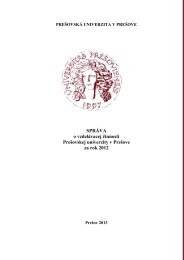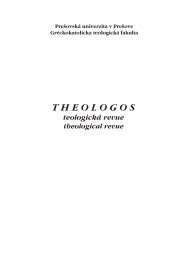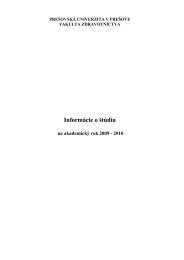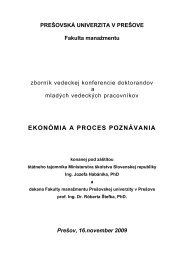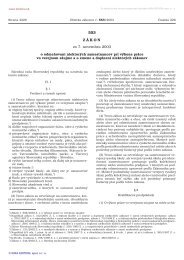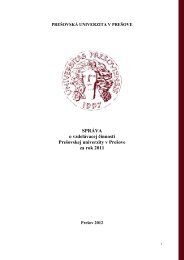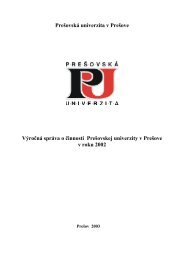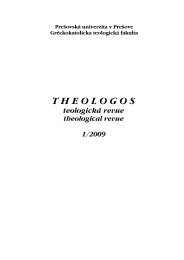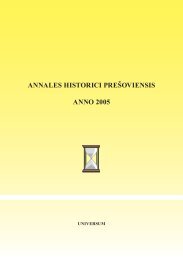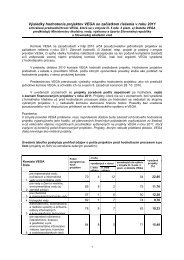T H E O L O G O S - Prešovská univerzita v Prešove
T H E O L O G O S - Prešovská univerzita v Prešove
T H E O L O G O S - Prešovská univerzita v Prešove
Create successful ePaper yourself
Turn your PDF publications into a flip-book with our unique Google optimized e-Paper software.
Bożena Drzewicka<br />
Asia. If a confrontation is to be discerned, it is not similar to that between<br />
different religious but it can be compared to the one between pragmatism<br />
and dogmatism or between provincialism and universalism. We are<br />
witnesses of a highly inspiring subsequent stage of the development of<br />
a cross-civilization dialogue. A plethora of new politological, ideological,<br />
anthropological or philosophical concepts is the obvious consequence,<br />
whereby the latter ones concern the understanding of history. An indirect<br />
consequence is the necessary negotiating and introducing of new paradigms<br />
in international relations. The cultural values have already become<br />
determinants of the future roles of each civilization in the international<br />
co-operation. Real security or stable peace can be achieved only through<br />
or global co-operation based on an intercultural understanding. 22<br />
A growing importance of transnational superstates can already be<br />
observed. It is believed that only integrated structures combining politics,<br />
economy and culture will dominate in the new international reality.<br />
A confirmation of this forecast is the present-day functioning of certain<br />
“superstates”, including the European Union (EU) or the Association of<br />
Southeast Asian Nations (ASEAN). The latter, which is a “regional superstates”,<br />
provides for a background for regional projects within the global<br />
system of economic co-operation. ASEAN itself does not initiate any<br />
common projects to promote a specific culture, a set of values or some<br />
ideological conceptions. Luck a promotion is carried out by some member<br />
states. The case of the EU is one in which an economic co-operation<br />
was followed by common political concepts as well as by agreements<br />
concerning a set of fundamental values. The two organizations mentioned<br />
substitute the nineteenth-century national states, whereby a partial<br />
absorption of the latter ones is observed. Local integration is no longer<br />
aimed at. The new aim seems to be a creation of much larger, transoceanic<br />
or transcontinental, regions. In the background, a certain extent<br />
of confrontation can already be discerned. A member of nations want to<br />
continue the confrontation while some other ones prefer to minimize it.<br />
In the past, this situation resulted in nationalizms, which are now substituted<br />
by transnationalizm. 23 An indirect result is the present-day tendency<br />
of different subjects of international relations to determine clear options<br />
for their activity.<br />
As for as the West and Asia are concerned, they remain antagonists<br />
in the dialogue focused on the future of the globe. Both highly emotional<br />
arguments and many a simplification in the analyses can be observed.<br />
22<br />
S. P. Huntington, Will more countries become democratic? “Political Science Quarterly”<br />
Summer 1984, No 99, p. 193-201.<br />
23<br />
For a detailed discussion see: A. W. Jelonek, op.cit., p. 97-100.<br />
30



